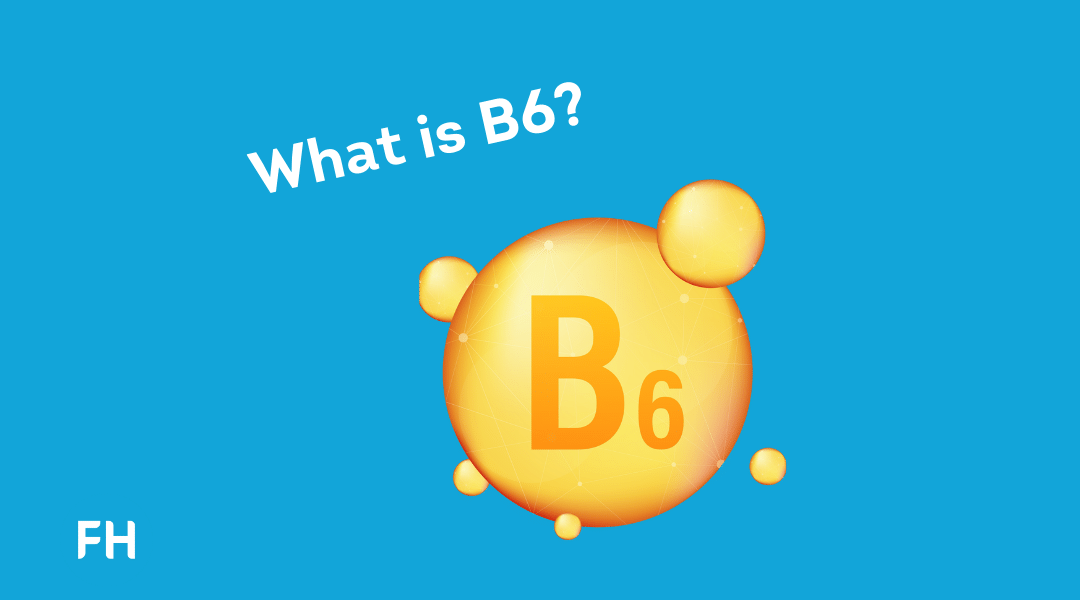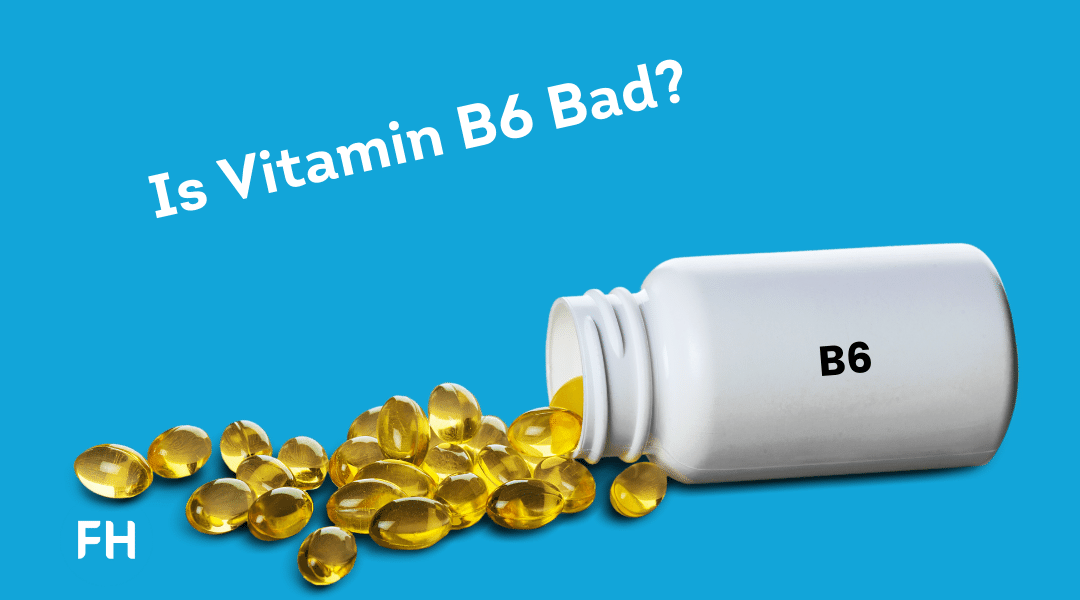**Disclaimer** this blog is in no way medical advice, and you should always consult your doctor on any medications or supplements.
What is B6 And Is Vitamin B6 Safe or Toxic
Vitamin B6 (pyridoxine) Vitamin B6 (pyridoxine) is one of the most important nutrients in the body. Did you know that B6 is involved in more bodily functions than almost any other single nutrient. This one crucial nutrient can affect both your physical and mental health.
Vitamin B6 is a water-soluble vitamin that is naturally present in many foods, and is available as a dietary supplement. Vitamin B6, is the generic name for six compounds (vitamers) with vitamin B6 activity:
1. Pyridoxine, which is an alcohol
2. Pyridoxal, an aldehyde
3. Pyridoxamine, which contains an amino group; and their respective 5’-phosphate esters. Pyridoxal 5’ phosphate (PLP) and pyridoxamine 5’ phosphate (PMP) are the active coenzyme forms of vitamin B6 [1,2].
You will find B6 in foods, supplements and also added to some foods as “fortified”. In this article I would like to talk about this crucial vitamin and if it will work for you.
What does B6 do in the body?
As I stated earlier, vitamin B6 is one of the most important nutrients in the body. I would like to state some main ways B6 works. Vitamin B6 is a coenzyme, meaning it is necessary for other functions in the body and is involved with more than 100 enzyme reactions.
Did you know B6 can be a significant part of metabolizing your food? Both PLP and PMP are involved in amino acid metabolism from the proteins, and PLP is also involved in the metabolism of carbohydrates, and lipids (fats) [3]. So if you are deficient in B6, your ability to break down your food becomes impaired inadvertently by your levels of B6
Vitamin B6 also plays a role in cognitive development through the biosynthesis of neurotransmitters. Neurotransmitters help regulate your mood and how you feel. Making some of those neurotransmitters all starts with vitamin B6. So if you are feeling like your mood is off, vitamin B6 is a good place to start.
Maintaining normal levels of homocysteine, a somewhat toxic amino acid in the blood, which can be a marker for good health, is also dependent upon vitamin B6. There is a process in your body called methylation and that is dependent on key B-vitamins, one being vitamin B6. Without the accrual level of B6 in the body, you may be left with a toxic level of homocysteine and issues with methylation. These are some of what vitamin B6 in the body does and how this essential nutrient can make you feel. Having ample amounts of this nutrient can benefit your body in multiple ways.

What are the benefits of B6
Now that you understand what vitamin B6 does in the body, you will now understand the importance of the benefits you will get from it. I want to highlight some benefits you will see in your body by having adequate amounts of vitamin B6, and here they are.
*Mood: Balancing your neurotransmitters like serotonin will help you feel less anxious and more balanced
*Hormonal: B6 is also important in the function of the adrenal glands. It helps in the production of adrenal hormones. So if you are feeling like you are in “fight or flight” then you may not have enough B-vitamins.
*Blood: Vitamin B6 is needed to regulate levels of homocysteine within the blood. High levels of homocysteine in the blood have been linked to inflammation and the development of heart disease and blood vessel issues, which may contribute to a heart attack. (2)
*Prevents Anemia: Vitamin B6 creates hemoglobin in the blood. The hemoglobin is later transported by red blood cells throughout the body to mobilize iron and bring oxygen to cells. Anemia occurs when the body doesn’t produce enough red blood cells.
What B6 Deficiency Looks Like
Having low levels of B6 can manifest in multiple symptoms, but here are a few examples.
*Sleep/Mood: The conversion of the amino acid L-3,4-dihydroxyphenylalanine (L-DOPA) into dopamine can only be done using vitamin B6. An adequate supply of vitamin B6 therefore contributes to a balanced neurotransmitter levels. Dopamine, serotonin and melatonin are necessary for falling asleep, facilitate the transition to sleep and calming the sympathetic system down.
*Anemia: People with a vitamin B6 deficiency can suffer from diarrhea, loss of appetite, vomiting and anemia.
*Nerves: If a severe deficiency, the peripheral nerves can degenerate, so that the movement sequences of the body can no longer be controlled properly.
Do I need a B6 Supplement?
To answer that question, I would answer, maybe. So, there is a reason why someone would need to supplement with vitamin B6. However, I would suggest taking a look at the reason why you think you must supplement with vitamin B6.
Are you supplementing for methylation issues, like the MTHFR gene SNP? Or do you have hormonal issues or energy problems? All of these are great reasons to supplement with vitamin B6. I would emphasize that supplements do work, but testing can give you clear evidence that you may or may not need vitamin B6.
Starting by working with a practitioner to run something like the Organic Acid test, which tells you your excretion levels of B6. In addition to that test, running a standard B6 panel through Labcorp of Quest can also be helpful to check serum levels. Finally, getting a Nutraval or Spectra cell test will help determine the cellular level of B6, which is ultimately the one that matters.
I see so many Floxies with MTHFR gene mutations, high B12, low serum B6 and high homocysteine. These results scream B6 supplementation and for good reason, but I have to listen to the symptoms and the person trying to figure out if B6 will work for them.
Finally, there is a way to decided if you should supplement with B6 and using symptomogly can help too. I would say that listening to your body on and off a supplement can speak volumes to you if you’re listening to how your body feels.
Is B6 Good or Bad for Floxies
I must hear or see the question at least twice a week. Obviously, there is a good reason why so many Floxies ask this. The alpha lipoic acid supplement comes in at a close second place as well. I understand the fear around taking supplements, I do, but your body absolutely needs B6 to survive.
The real question is when to take it, how much and for how long. I am going to address the possible side effects in the next section, and they are valid. Throughout the years of going through this, I have seen so many posts and stories about B6 being bad. I am sorry to say this, but it is not a supplement to be scared of if you know how and when to take it.
Pyridoxine is water-soluble and excreted by the kidneys. It is shown in lab testing that excesses are excreted via the urine so that toxic levels are never reached. Pyridoxic acid occurs in the urine of patients who take any excess of vitamin B6. This is a harmless excretion product.
I like to think of B6 acting like the Goldilocks effect, whereas too much or too little can be a bad thing. I have proven this with so many who have tried B6 in the past and shown to have issues. With proper guidance, the right form, and the right dosage, your body after FQ exposure really has no problem with B6. Check the bottom of the post for more information on what to do.
However, the real issue here with fluoroquinolone toxicity, in my opinion and experience, is what pyridoxine is bound to in supplement form. That seems to be one big part of what causes side effects for so many that take vitamin B6 in supplement form. Let me explain the two most prominent forms of vitamin B6 available to date.
Vitamin B6 is essential for human life and after Fluoroquinolone exposure.
What is Pyridoxal Phosphate (P-5-P)?
Pyridoxal phosphate or P-5-P is the “active” form of vitamin B6, a crucial nutrient for physical, mood and mental well being. This form is the newer more advanced form of Pyridoxine. Here are some of the benefits of using this form of Pyridoxine.
*Studied to be more bioavaible
*Doesn’t require conversion
*May be more efficient than pyridoxine
Remember in the prior paragraph we spoke about “vitamers” and their use in the B6 supplements. Here is why they help the P-5-P form to be more bio available.
These so-called pyridoxine vitamers have specific duties once in your body.The P-5-P form of the vitamin, Pyridoxal-5′-phosphate(PLP or P-5-P) drives over 140 enzyme reactions.
The active form is responsible for the health effects, and its blood levels are the best lab marker of vitamin B6 status [12].Also, there are two enzymes in the liver that help convert other forms of B6 to the active form, and they are pyridoxal (PL) kinase and pyridoxine-5’-phosphate (PNP) oxidase. So, it makes sense to use the P-5-P form right?
The real issues are that supplement companies put high dose of P-5-P in their products, which can do the following. High vitamin B6 doses may tell the body it has too much of this vitamin. In turn, enzymes that convert vitamin B6 to P-5-P are blocked, reducing P-5-P levels [74]. This is why I have put a link to my favorite form that most my clients are on and causing 0 reactions. For some an aldehyde issue can occur but can be easily addressed with carnosine supplementation.
Not requiring the use of the liver, which in most cases has issues after fluoroquinolone toxicity, can be a good thing. Although we come back to the Goldilocks effect and it comes down to dose and duration. Making sure you have the proper genetics (MTHFR, CBS etc) to handle supplementation of this kind can be useful.
What Is Pyridoxine HCL?
B6 comes in the form of pyridoxine hydrochloride [HCl]. This is when B6, or pyridoxine, is bound to hydrochloride salt.
Pyridoxine Hydrochloride, also called Pyridoxine HCL, is the hydrochloride salt of pyridoxine, a water-soluble B vitamin. However, this form requires the use of the liver to convert the B6 to its active form. This would be fine if you know you have those genes working properly, and may be a better form for many. However, I disagree for the reason that the liver becomes an issues after FQ Toxicity.
Pyridoxine hydrochloride is converted in the liver into the metabolically active coenzyme form pyridoxal 5′-phosphate (P5P), an essential cofactor in many enzymatic reactions. The real issue here is that this form requires conversion and can become toxic in the blood if the liver cannot keep up.
I also see many that have small fiber neuropathy from FQ toxicity, and B6 plays a role here too. I see some get worse from using B6 supplements and like I stated it usually in most cases from the form and dose of B6 exacerbating symptoms from the drug. That is why testing, and working with someone who understands this issue, is so important.
So in conclusion we have a need for B6 in humans, but after fluoroquinolone cell dysfunctions causes major issues as you already know and the B6 issues seems to be prominent. For many B6 can be a lifesaver and for others it can do harm if not taken in the correct form or dose. I would say not to be afraid of supplements if you “know” that your body requires it, if not get it from food is often best. Check out my favorite form of B6 below.
Vitamin B6 and magnesium
Magnesium is one of the essential minerals and must therefore be supplied to the body from the outside. The mineral is involved in cell division, nerve function and muscle contraction. As you know, for a Floxie, magnesium is so important.
A magnesium deficiency can lead to muscle cramps, depression, fatigue, dizziness or irregular heartbeat. For an improved absorption of magnesium from the intestine into the blood and into the body cells, it is advisable to take the mineral with vitamin B6. Magnesium can help with B6 to make those significant neurotransmitters to help mood and brain function.
I see correlating issues with Floxies showing low magnesium and B6 resulting in massive decencies in Serotonin, Epinephrine and ultimately compounds the GABA receptor issues for some as well.

Does B6 supplementation cause side effects
As I said, vitamin B6 is vital for the human body. Taking a large dose for a long time can get you into trouble. An overdose of vital substances can lead to unwanted side effects. Is an overdose possible even when taking vitamin B6, and how can you recognize this?
Overdose only when taking large amounts
Symptoms of an overdose of vitamins only appear when vitamin B6 is taken in higher doses over a period of 12 to 40 months. With long-term intake of 1000 mg to 6000 mg vitamin B6, neurological disorders, severe nerve pain too and gastrointestinal pain can occur. Supplementing in excess can lead to symptoms such as painful Peripheral Neuropathy.
Other symptoms of a B6 overdose are painful skin lesions and stomach and intestinal complaints such as nausea, diarrhea or heartburn. I would suggest that one person’s tolerance for B6 at a certain amount is different for another. This is why I suggest you do the absolute minimum and work your way up with the supplement while testing your blood levels.
Conclusion
I have seen many tolerate B6, when needed, if they supplement correctly. What you will have to do is determine the effective dose, usually 1-3mg of P5P is well tolerated in many of the people I have coached or spoken too, The second trick is to make sure you have the cofactors (other B-vitamins, minerals etc). Finally, deciding if you have the genetic SNPs that make you under methylate, then you will have to address that issue too.
I hope this article was insightful and informative. When writing this, I wanted to dispel the myth that B6 is bad, and you should never take it. I intended to inform you that your body does B6 and yes, you may need a supplement. Though I would say working with a practitioner, starting with food first and see if your symptoms get better first. This is what worked for me and I have been using B6 for years, and it actually helped my nerve pain with other supplements too. Comment below if you have any questions.










… [Trackback]
[…] Find More Info here on that Topic: floxiehope.com/is-vitamin-b6-safe-or-toxic/ […]
… [Trackback]
[…] Find More here on that Topic: floxiehope.com/is-vitamin-b6-safe-or-toxic/ […]
… [Trackback]
[…] Here you will find 41794 additional Info on that Topic: floxiehope.com/is-vitamin-b6-safe-or-toxic/ […]
… [Trackback]
[…] Read More Information here on that Topic: floxiehope.com/is-vitamin-b6-safe-or-toxic/ […]
… [Trackback]
[…] Find More Info here to that Topic: floxiehope.com/is-vitamin-b6-safe-or-toxic/ […]
… [Trackback]
[…] Find More on that Topic: floxiehope.com/is-vitamin-b6-safe-or-toxic/ […]